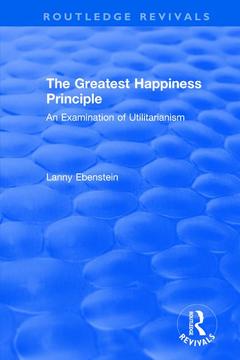Routledge Revivals: The Greatest Happiness Principle (1986) An Examination of Utilitarianism Routledge Revivals Series
Auteur : Ebenstein Lanny

First published in 1991, The Greatest Happiness Principle traces the history of the theory of utility, starting with the Bible, and running through Plato, Aristotle, and Epicurus. It goes on to discuss the utilitarian theories of Jeremy Bentham and John Stuart Mill in detail, commenting on the latter?s view of the Christianity of his day and his optimal socialist society. The book argues that the key theory of utility is fundamentally concerned with happiness, stating that discussions of happiness have been largely left out of discussions of utility, it also argues utility as a moral theory, posing the question ultimately, what is happiness?
Introduction 1. Happiness in the Bible 2. The Role of Happiness in Plato and Aristotle 3. Epicurus 4. Bentham’s Theory of Utility 5. John Rawls’ Non-Utilitarian Theory 6. A New Theory of Utility Appendices A. Utility and Justice B: Henry Sidgwick’s Utilitarian Contributions C. Comments on Various Utilitarian Writers D. Glimpses of a Utilitarian Future E. Free Will and Determinism F. Teleologism-Deontologism, Consequentialism-Non-Consequentialism G. Why Happiness Bibliography Supplementary Materials: "Mill’s Theory of Utility" Mill’s "Quality" Sidgwick’s Ethics
Date de parution : 03-2021
15.6x23.4 cm
Date de parution : 12-2017
15.6x23.4 cm
Thèmes de Routledge Revivals: The Greatest Happiness Principle (1986) :
Mots-clés :
Held; Greatest Happiness Principle; Happiness; Greatest Happiness; Happiness Principle; Follow; Utilitarianism; Summum Bonum; Bible; Mill's Theory; Plato; Large Family; Aristotle; Greatest Personal Happiness; Epicurus; Non-utilitarian Theory; Jeremy Bentham; Rawls States; Utility; Bentham States; Chapter III; Henry Sidgwick; Young Man; Utilitarian Writers; Bentham's Theory; Free Will; Difference Principle; Determinism; Mill Stated; Teleologism; High Quality Pleasures; Deontologism; Hoi Polloi; Consequentialism; Fair Equality; Non-Consequentialism; Extensive Total System; Alan O; Ebenstein; Bentham's Position; Original Position; Diogenes; Good Life


